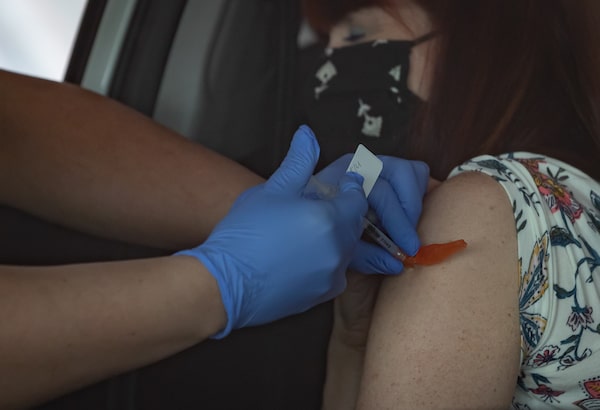
Nurse Virpal Sidhu reaches into a vehicle to administer the Moderna COVID-19 vaccine to Sharon Brock at a Fraser Health drive-thru vaccination site, in Coquitlam, B.C., on May 5, 2021.DARRYL DYCK/The Canadian Press
In the week or two prior to receiving the AstraZeneca vaccine on April 25, Yolande House said she was stressed.
Ms. House, a 44-year-old writer who lives in Toronto, said she had been frustrated and upset by the difficulty of finding a vaccination appointment, “nervous about the blood-clot issue,” and concerned about COVID-19 – stressors that were compounded by the pandemic’s third wave and uncertainty over whether other vaccines would be offered to her age group any time soon.
“The next week, I got the tell-tale signs of my period and was surprised as my menstruation app told me I was a whole week early, which very rarely happens – maybe every couple of years,” said Ms. House, who shared her symptoms on Twitter after being surprised by a thread of similar stories.
Ms. House is one of hundreds of menstruating women who’ve taken to social media to share inconsistencies in their periods after their COVID-19 vaccinations. On TikTok, Twitter and Facebook, people have expressed concerns about early or missed periods, unusually painful cramping or heavier bleeding.
As some of these threads spark fears of infertility, experts are stressing that menstrual changes are common and do not cause infertility. While research is needed to determine any correlation between COVID-19 vaccinations and menstruation, anecdotal reports about irregularities are not a cause for concern, said Liisa Galea, a neuroscientist and professor of psychology at the University of British Columbia.
According to the Society of Obstetricians and Gynaecologists of Canada, or SOGC, there is no known association between COVID-19 vaccines and menstrual changes.
“Any individual menstrual changes can be triggered by many life events, including weight changes or stress, as well as the changes that occur as a part of a woman’s life,” SOGC chief executive officer Jennifer Blake said in an e-mailed statement.
Health Canada said in an e-mailed statement that rates of non-serious adverse event reports are observed for each approved vaccine, “with serious report rates continuing to remain low.” Health Canada and the Public Health Agency of Canada receive reports of adverse events after immunization with COVID-19 vaccines in Canada through the Canada Vigilance Program and the Canadian Adverse Events Following Immunization Surveillance System.
As of May 10, the most frequently reported side effects after COVID-19 vaccination in Canada are pain, redness and swelling in the vaccination site.
Menstrual changes after vaccination are “more than likely” a positive response in the body, said Dr. Galea at UBC.
“We see that there are changes in immune signalling across the menstrual cycle, so I don’t actually think it’s super surprising that there might be some changes, because you’re stimulating your immune system. That’s what the vaccine [is] doing.
“Just like a fever, just like … getting the chills or aches or something after [a vaccine], or a sore arm, it means that, you know, it worked for you.”
Experts also say stress of any kind could be why many menstruating women are experiencing irregularities.
“I think sometimes we think of the menstrual cycle as somehow mechanical, but in fact it’s very organic,” said Jerilynn C. Prior, a professor of endocrinology at UBC, who recommends menstruating people track their experiences using online tools available through the Center for Menstrual Cycle and Ovulation Research website.
Dr. Prior said the most common reported menstrual symptoms she’s heard of from vaccinated women have been “flow happening sooner than women expected” or heavy flow.
She said teenagers and women in perimenopause – a transition to menopause that can begin as early as 35, but typically starts at around 48 – have higher instances of menstrual irregularities, and that it’s important to understand that “just living in the uncertainty” of the pandemic, or experiencing changes in support networks or jobs, can cause abnormal ovulation.
“Why I’m suspecting that we’re getting these reports about unexpectedly early flow in women who’ve had their COVID-19 vaccination is because they didn’t ovulate anyway,” said Dr. Prior, who explained that feedback from stress systems could trigger flow.
“What they’re experiencing is irregular, but … it’s a temporary, one-cycle-only thing. In other words, it’s not going to carry on and create infertility. It isn’t likely to become any problem.”
Our Morning Update and Evening Update newsletters are written by Globe editors, giving you a concise summary of the day’s most important headlines. Sign up today.